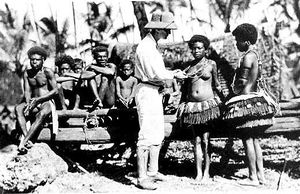وصف الأعراق البشرية
| علم الإنسان |
|---|
 |
| الحقول |
| حقول فرعية اجتماعية وثقافية |
| حقول لغوية فرعية |
| الأطر البحثية |
| نظريات أساسية |
| مفاهيم رئيسية |
| قوائم |
وصف الأعراق البشرية أو الإثنوگرافيا Ethnography (من اليونانية ἔθνος إثنوس "التراث، الشعب" وγράφω گرافو "كتابة")، هو تصميم بحثي نوعي بهدف استكشاف الظواهر الثقافية. الدراسة الميدانية الناتجة أو تقرير الحالة يعكس المعرفة والنظام الدلالي في حياة الجماعة الثقافية.[1][2][3] وصف الأعراق البشرية هو وسائل لإعادة تمثيل الصور والكتابات، الخاصة بثقافة الأشخاص.
وصف الأعراق البشرية، كبيانات تجريبية على المجتمعات والثقافات البشرية، كانت رائدة في الفروع الحيوية، الاجتماعية، والثقافية من علم الإنسان، لكنها أيضاً أصبحت شائعة في علوم اجتماعية في علم الاجتماع-العام،[4] دراسات التواصل، التاريخ - سواء دراسة الجماعات العرقية، التشكيلات، التكوينات، إعادة التوطين، خصائص الرفاع الاجتماعي، النسبية، الروحانية، و a people's ethnogenesis.[5] وصف الأعراق البشرية التقليدي هو دراسة تاريخية[6][7] وتشمل تاريخ موجز، وتحليل الأرض، المناخ، والموئل. في جميع الحالات يجب أن تكون انعكاس، تقدم إسهام أساسي في سبيل فهم الحياة الاجتماعية للبشر، أن يكون لها تأثير جمالي على القارئ، وتعبر عن واقع صادق. يرصد وصف الأعراق البشرية العالم (الدراسة) من منظور الموضوع (وليس الإثنوگرافي المساهم) وتسجل السلوك المرصود بالكامل وتصف جميع العلاقات ذات المعنى الرمزي باستخدام مفاهيم تتجنب التفسيرات العارضة.
. . . . . . . . . . . . . . . . . . . . . . . . . . . . . . . . . . . . . . . . . . . . . . . . . . . . . . . . . . . . . . . . . . . . . . . . . . . . . . . . . . . . . . . . . . . . . . . . . . . . . . . . . . . . . . . . . . . . . . . . . . . . . . . . . . . . . . . . . . . . . . . . . . . . . . . . . . . . . . . . . . . . . . . .
التاريخ والمعنى
The word 'ethnography' is derived from the Greek ἔθνος (ethnos), meaning "a company, later a people, nation" and -graphy, meaning "writing". Ethnographic studies focus on large cultural groups of people who interact over time. Ethnography is a set of qualitative methods that are used in social sciences that focus on the observation of social practices and interactions.[9] Its aim is to observe a situation without imposing any deductive structure or framework upon it and to view everything as strange or unique.[10]
The field of anthropology originated from Europe and England in late 19th century. It spread its roots to the United States at the beginning of the 20th century. Some of the main contributors like E. B. Tylor (1832–1917) from Britain and Lewis H. Morgan (1818–1881), an American scientist, were considered as founders of cultural and social dimensions. Franz Boas (1858–1942), Bronislaw Malinowski (1884–1942), Ruth Benedict (1887–1948), and Margaret Mead (1901–1978), were a group of researchers from the United States who contributed the idea of cultural relativism to the literature. Boas's approach focused on the use of documents and informants, whereas Malinowski stated that a researcher should be engrossed with the work for long periods in the field and do a participant observation by living with the informant and experiencing their way of life. He gives the viewpoint of the native and this became the origin of field work and field methods.
الأصول
Gerhard Friedrich Müller developed the concept of ethnography as a separate discipline whilst participating in the Second Kamchatka Expedition (1733–43) as a professor of history and geography. Whilst involved in the expedition, he differentiated Völker-Beschreibung as a distinct area of study. This became known as "ethnography," following the introduction of the Greek neologism ethnographia by Johann Friedrich Schöpperlin and the German variant by A. F. Thilo in 1767.[11] August Ludwig von Schlözer and Christoph Wilhelm Jacob Gatterer of the University of Göttingen introduced the term into the academic discourse in an attempt to reform the contemporary understanding of world history.[11][12]
Herodotus, known as the Father of History, had significant works on the cultures of various peoples beyond the Hellenic realm such as the Scythians, which earned him the title "philobarbarian", and may be said to have produced the first works of ethnography.
طرق جمع البيانات
الاختلافات بين التخصصات
علم الإنسان الثقافي والاجتماعي
علم الاجتماع
| علم الاجتماع |
|---|
| بوابة |
| النظريات والتاريخ |
| مناهج البحث |
| الموضوعات والحقول الفرعية |
دراسات التواصل
مجالات أخرى
التقييم الإثنوگرافي
الأخلاق
فضائل تاريخية
. . . . . . . . . . . . . . . . . . . . . . . . . . . . . . . . . . . . . . . . . . . . . . . . . . . . . . . . . . . . . . . . . . . . . . . . . . . . . . . . . . . . . . . . . . . . . . . . . . . . . . . . . . . . . . . . . . . . . . . . . . . . . . . . . . . . . . . . . . . . . . . . . . . . . . . . . . . . . . . . . . . . . . . .
مهارات تقنية
إثنوگرافيا ذاتية
انظر أيضاً
- Area studies
- Critical ethnography
- Ethnography of communication
- Realist ethnography
- وصف الأعراق البشرية أونلاين: شكل من وصف الأعراض البشرية يختص بعمل دراسات أونلاين.
- Participant observation
- Video ethnography
- Living lab
إثنوگرافيون بارزون
- Gerhard Friedrich Müller (1705-1783)
- Manuel Ancízar Basterra (1812-1882)
- Franz Boas (1858–1942)
- Sergey Oldenburg (1863-1934)
- إدوارد ساپير (1884–1939)
- ريموند فيرث (1901–2002)
- مارگريت ميد (1901–1978)
- گريگوري باتسون (1904–1980)
- ماري دوگلاس (1921–2007)
- Napoleon Chagnon (و. 1938)
- Marilyn Strathern (و. 1941)
- Elijah Anderson (و. 1943)
- Veena Das (و. 1945)
- Kristen R. Ghodsee (و. 1970)
- Diamond Jenness
- روث لاندس
- Edmund Leach
- José Leite de Vasconcelos
- كلود ليڤي-ستروس
- Bronisław Malinowski
- David Maybury-Lewis
- Nicholas Miklouho-Maclay
- Nikolai Nadezhdin
- Lubor Niederle
- Dositej Obradović
- Alexey Okladnikov
- ريتشارد پرايس
- August Ludwig von Schlözer
- Lila Abu-Lughod
- Sudhir Venkatesh
- * پول ويليس
- Susan Visvanathan
المصادر
- ^ Geertz, C. (1973). Thick description: Toward an interpretive theory of culture.
- ^ In The Interpretation of Cultures: Selected Essays (pp 3-30). New York: Basic Books, Inc., Publishers
- ^ Philipsen, G. (1992). Speaking Culturally: Explorations in Social Communication. Albany, New York: State University of New York Press
- ^ "Ethnology" at dictionary.com.
- ^ Токарев, Сергей Александрович (1978). История зарубежной этнографии (in Russian). Наука.
{{cite book}}: Cite has empty unknown parameters:|month=and|coauthors=(help)CS1 maint: unrecognized language (link) - ^ Ember, Carol and Melvin Ember. Cultural Anthropology. 2006. Prentice Hall, Chapter One
- ^ Heider, Karl. Seeing Anthropology. 2001. Prentice Hall, Chapters One and Two.
- ^ Burkhart, Louise M. (10 June 2003). "Bernardino de Sahagun: First Anthropologist (review)". The Catholic Historical Review. 89 (2): 351–352. doi:10.1353/cat.2003.0100. S2CID 162350550.
- ^ "What is Ethnography? – ERIAL Project". www.erialproject.org (in الإنجليزية الأمريكية). Retrieved 2017-06-20.
- ^ Preece, J., Sharp, H., & Rogers, Y. (2015). Interaction Design: Beyond Human-Computer Interaction (4th edition). Wiley.
- ^ أ ب Vermeulen, Han F., 2008, Early History of Ethnography and Ethnology in the German Enlightenment, Leiden, p. 199.
- ^ Vermeulen, Hans (2008). Early History of Ethnograph and Ethnolog in the German Enlightenment: Anthropological Discourse in Europe and Asia, 1710-1808. Leiden: Privately published.
قراءات إضافية
- Agar, Michael (1996) The Professional Stranger: An Informal Introduction to Ethnography. Academic Press.
- Clifford, James & George E. Marcus (Eds.). Writing Culture: The Poetics and Politics of Ethnography. (1986). Berkeley: University of California Press.
- Douglas, Mary and Baron Isherwood (1996) The World of Goods: Toward and Anthropology of Consumption. Routledge, London.
- Erickson, Ken C. and Donald D. Stull (1997) Doing Team Ethnography : Warnings and Advice. Sage, Beverly Hills.
- Fine, G. A. (1993). Ten lies of ethnography. Journal of Contemporary Ethnography, 22(3), p. 267-294.
- Geertz, Clifford. The Interpretation of Cultures.
- Gubrium, Jaber F. (1988). "Analyzing Field Reality." Thousand Oaks, CA: Sage.
- Gubrium, Jaber F. and James A. Holstein. (1997) "The New Language of Qualitative Method." New York: Oxford University Press.
- Gubrium, Jaber F. and James A. Holstein. (2009). "Analyzing Narrative Reality." Thousand Oaks, CA: Sage.
- Heath, Shirley Brice & Brian Street, with Molly Mills. On Ethnography.
- Hymes, Dell. (1974). Foundations in sociolinguistics: An ethnographic approach. Philadelphia: University of Pennsylvania Press.
- Kottak, Conrad Phillip (2005) Window on Humanity : A Concise Introduction to General Anthropology, (pages 2–3, 16-17, 34-44). McGraw Hill, New York.
- Marcus, George E. & Michael Fischer. Anthropology as Cultural Critique: An Experimental Moment in the Human Sciences. (1986). Chicago: University of Chicago Press.
- Miller, Daniel (1987) Material Culture and Mass Consumption. Blackwell, London.
- Spradley, James P. (1979) The Ethnographic Interview. Wadsworth Group/Thomson Learning.
- Salvador, Tony; Genevieve Bell; and Ken Anderson (1999) Design Ethnography. Design Management Journal.
- Van Maanen, John. 1988. Tales of the Field: On Writing Ethnography Chicago: University of Chicago Press.
- Westbrook, David A. Navigators of the Contemporary: Why Ethnography Matters. (2008). Chicago: University of Chicago Press.
وصلات خارجية
- 100 of the Most Influential Ethnographies and Anthropology Texts
- Ethnographic Praxis in Industry Conference
- Genzuk, Michael (2003) A Synthesis of Ethnographic Research
- Division of Anthropology, American Museum of Natural History - Over 160,000 objects from Pacific, North American, African, Asian ethnographic collections with images and detailed description, linked to the original catalogue pages, field notebooks, and photographs are available online.
- Ross Archive of African Images
- Ethnographic material collection from Northern Anatolia and Caucasus -Photo Gallery
- Ethnography.com A community based Ethnography website for academic and professional ethnographers and interested parties
- New Zealand Museum Images of objects from Pacific cultures.
- University of Pennsylvania's "What is Ethnography?" Penn's Public Interest Anthropology Web Site
- American Ethnography -- Definitions: What is Ethnography? A collection of quotes about ethnography (Malinowski, Lévi-Strauss, Geertz, ...)
- Doing ethnographies (Concepts and Techniques in Modern Geography)
- Cornell University Library Southeast Asia Visions
- Ethnography for the masses 2CV's Practical Application of Ethnography in Market Research
- Scott Polar Research Institute Arctic Material Culture Collection
 Texts on Wikisource:
Texts on Wikisource:
- Otis Tufton Mason (1905). "Ethnography". New International Encyclopedia.
- Chisholm, Hugh, ed. (1911). . دائرة المعارف البريطانية (eleventh ed.). Cambridge University Press.
{{cite encyclopedia}}: Cite has empty unknown parameter:|coauthors=(help) - "Ethnography". Encyclopedia Americana. 1920.
- "Ethnography". Collier's New Encyclopedia. 1921.
- CS1 الإنجليزية الأمريكية-language sources (en-us)
- Articles containing Ancient Greek (to 1453)-language text
- Pages using div col with unknown parameters
- مقالات المعرفة المحتوية على معلومات من دائرة المعارف البريطانية طبعة 1911
- وصف الأعراق البشرية
- علم الإنسان
- طرق التطور
- طرق في علم الاجتماع
- مؤشر علم الاجتماع
- علم الأعراق





